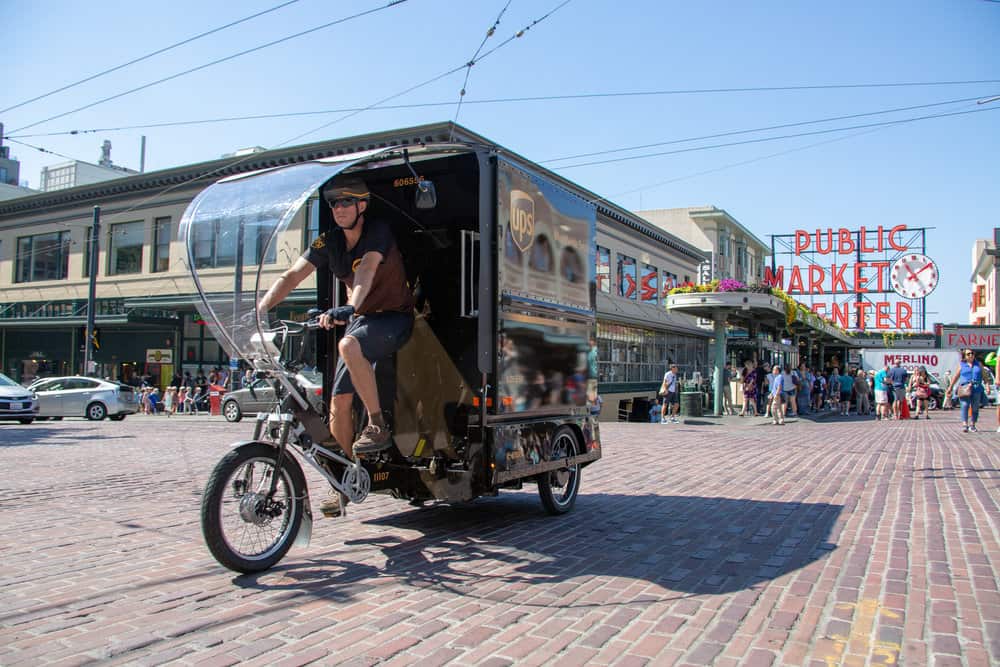
It’s back to the future for UPS (NYSE: UPS), a company that started in Seattle as a modest bike and pedestrian courier more than a century ago before becoming a global player serving 220 countries and territories.
On Monday, November 5th, UPS returns to its pedal power origins with a year-long pilot project that will make deliveries using electric-assist cargo bikes in downtown Seattle.
The Seattle Department of Transportation and the University of Washington’s Urban Freight Lab, an initiative that brings together city planners, retailers and freight companies, have partnered on the project to track the pilot’s impact on traffic and pollution. Depending on the outcome, UPS will expand the service to other parts of Seattle.
“UPS is very focused on urban logistics, and our ‘cycle logistics’ solutions, which the cargo e-bike is part of, are all designed to address congestion and pollution,” UPS spokesperson Glenn Zaccara said in an email.
Traffic in cities is getting a lot worse as Amazon, WalMart and other retailers ramp up delivery services. The growth of e-commerce boosted global parcel volume by 48 percent from 2014-2016, according to Pitney Bowes’ Parcel Shipping Index. A report from the World Economic Forum and Deloitte attributed seven percent of the traffic in U.S. cities to delivery trucks.
E-bikes are one possible solution. They take trucks off the road while potentially boosting efficiencies. Unlike cars, e-bikes can circumvent traffic jams by slipping through back alleys where cars are not allowed. E-bikes can also park on the sidewalk instead of circling the block for a permitted parking space.
“They can’t carry as much as a fully loaded truck, but they are physically moving,” said Barbara Ivanov, director of the Urban Freight Lab. “They are agile.”
During the pilot project, UPS couriers will drive on sidewalks and bike lanes to make their deliveries.
When it comes to cycle logistics, Europe is way ahead of the U.S. FedEx (NYSE: FDX) runs e-bikes in Paris, and UPS launched its first cargo e-bike in Hamburg, Germany in 2012. Since then UPS has rolled out e-assist bikes in more than 30 metropolitan areas, only one of which, Pittsburgh, is in the U.S.
What distinguishes the Seattle bike pilot from other UPS cycling services are detachable containers, Zaccara said, which can hold up to 400 pounds. The bike is equipped with a battery-powered electric motor that can travel longer distances than traditional bikes, carry substantial loads and navigate hills and other terrain.
Other companies, big and small, are experimenting with bike delivery. Platforms like Uber Eats and Postmates use bike couriers in addition to cars. Amazon attempted a bike service for Amazon Prime a couple of years ago but has since shut it down.
Portland’s B-Line Sustainable Urban Delivery, a local business specializing in last- mile distribution, has grown from two e-trikes in 2009 to seven today. Another three will be operational in 2019, says founder and CEO Franklin Jones. The company, which serves restaurants, offices and regional and institutional buyers, posts revenues of $1 million annually and eventually plans to roll out in other cities.
“When you look at the demands of inner city or urban neighborhoods, the units of delivery are becoming smaller and smaller and the demand and frequency of those deliveries is increasing,” Jones said. “We feel our model, our platform, is very applicable to the demands of today’s market.”
The Seattle UPS pilot is running small. Only one bike will be used over the course of the year. Employees can request the bike routes and are selected based on seniority and other criteria.
“There’s plenty of interest in this route among our drivers,” Zaccara said.










